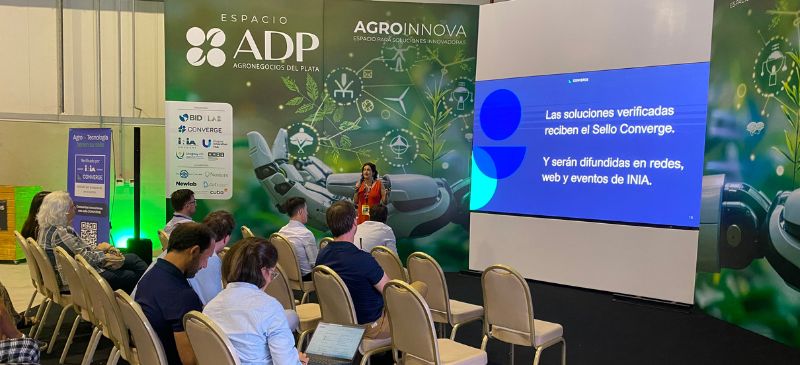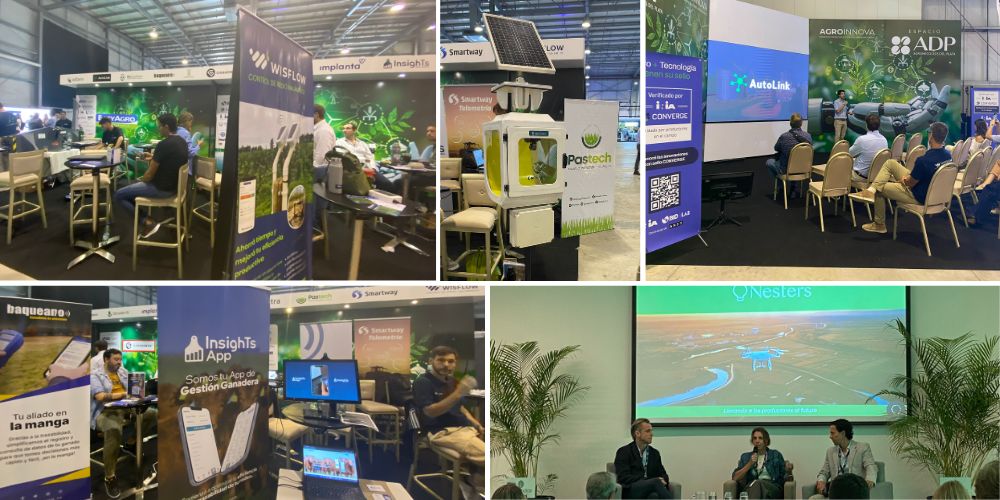- Home
- About us
- News
- Events
- EXPORT Export
-
BUY
Buy
Buy
- INVEST Invest
- COUNTRY BRAND Country Brand
-
INFORMATION CENTER
Information center
InformationCenterInformationCenterReports Country reports Department reports Foreign trade reports Product-Destination worksheet Sectors reports Work documentsStatistical information Classification Uruguay XXI Exports Imports Innovative National Effort Macroeconomic Monitor Tools Buyers Exporters Investors
- Contact
-
Languages
Uruguay Sets Course to Emerge as a Leading Agtech Hub for the Future of Agriculture
The Agroinnova space at Agro en Punta, coordinated by Uruguay XXI along with other institutions, showcased important projects and companies in the agricultural sector, emphasizing the country’s innovative potential.
Share:

The Agtech sector has experienced rapid growth globally, revolutionizing agricultural production through innovative solutions. In Uruguay, this industry is supported by two key pillars: agriculture and technology. The merging of these sectors has led to the emergence of successful startups that enhance productivity, efficiency, and sustainability in agriculture through the digitalization and automation of processes.
At Agro en Punta 2025, the agro-export fair that held its second edition, innovation took center stage in the Agroinnova space. Over 60 startups participated in a demo day organized by IDB Lab, Converge, INIA, Uruguay Innovation Hub, Uruguay XXI, and ANII, showcasing disruptive solutions for agriculture. This event highlighted local innovative potential and attracted international companies interested in expanding their operations in the region, positioning Uruguay as an ideal destination for investment in agricultural technology.
A Country for Innovation and Investment
Among the Uruguayan companies that presented at Agroinnova were initiatives addressing strategic challenges in the sector. For instance, Baqueano is a precision livestock tool that allows users to record and consult livestock data, improving decision-making. Used across Latin America, it optimizes traceability and facilitates health and reproductive management. Another participating startup, Gander IA, has developed a solution integrating drones with artificial intelligence to monitor livestock. The captured images are processed and sent to an application that provides accurate real-time data to producers. Meanwhile, BioControl focuses on intelligent pest monitoring, offering strategic information for more efficient management while reducing the environmental impact on crops.

In parallel, Agro en Punta hosted a demo day coordinated by The Yield Lab Latam and Nesters, providing a crucial platform for startups in the region to present their innovations to a jury composed of representatives from the Inter-American Development Bank (IDB) and the National Institute for Agricultural Research (INIA). This international engagement reinforced Uruguay’s attractiveness as a base for companies in the Agtech sector looking to expand in Latin America.
Uruguay offers exceptional conditions for the growth of the Agtech sector, including institutional stability, advanced technological infrastructure, and support from organizations that facilitate the validation and scalability of innovative solutions.
During the inauguration of Agro en Punta, President Luis Lacalle Pou emphasized Uruguay’s role in the evolution of the agro-export sector and its potential for future growth. “Our country has enormous strengths. We are part of an evolutionary and forward-looking process, where Uruguay will continue to position itself as a key player in the agricultural world,” he stated.
Minister of Livestock, Agriculture, and Fisheries Fernando Mattos highlighted the significance of agriculture in the Uruguayan economy, stating, “We are the most agricultural country in the world; our commitment is to guarantee sustainable production, with added value and quality certification.” He also underscored Uruguay’s political and economic stability as a crucial factor for attracting investment and emphasized the country’s leadership in the green economy. “Uruguay has been at the forefront of attracting international financing with environmental commitments. Our production system has traceability and sustainability certifications that establish us as a reliable country in international markets,” he remarked.
Luiz Ros, the IDB representative in Uruguay, praised the country’s innovative spirit. “Within the IDB, we often say that Uruguay is the region’s laboratory. When you want to think of something innovative, you think of Uruguay.” He stressed the importance of combining technological innovation with sustainability and inclusion. “It is time to promote agriculture 2.0 and commit to digital transformation, irrigation efficiency, and innovation development in Uruguay. This country has an impressive innovative spirit, and we want to support its evolution towards even more sustainable production,” he said.
Through various private and public initiatives, Uruguay is fostering resilience to climate change and adopting disruptive technologies in agriculture. Along with the growing interest of foreign companies in testing their developments in Uruguay, these factors reinforce its position as a regional hub for the digital transformation of the agro-industrial sector.
